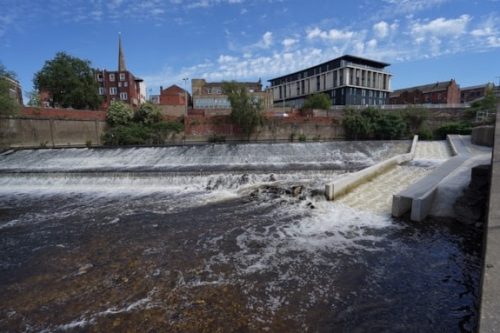Yorkshire Water must pay £40m package following ‘unacceptable’ breach

Utility company Yorkshire Water has apologised after being ordered by regulator Ofwat to pay out an enforcement package of £40m to make good “serious failures” in how it managed its sewage systems.
Ofwat says its probe uncovered failings which amounted to a significant breach of the company’s legal obligations, inflicting an unacceptable impact on the environment and customers.
The ruling means Yorkshire Water must:
- Pay £36.6m during 2025-30, to prioritise work on some of the most problematic storm overflows in environmentally sensitive areas to ensure they spill less than 20 times a year.
- Contribute £3.4m of support to the Great Yorkshire Rivers Partnership to enable it to go beyond its target for the next five years of clearing artificial barriers in Yorkshire rivers, which will improve water quality and biodiversity and reconnect more than 500 km of river.
- Commit to an action plan to ensure all storm overflows are compliant with legal requirements.
Lynn Parker, senior director for enforcement at Ofwat, said: “Our investigation has found serious failures in how Yorkshire Water operated and maintained its sewage works and networks, which has resulted in excessive spills from storm overflows. This is a significant breach and is unacceptable.
“We are pleased Yorkshire Water has recognised this failure and is taking steps to put it right for the benefit of customers and the environment.
“They deserve credit for stepping up and agreeing an enforcement package with us that will help get things back on track as soon as possible. These commitments will contribute to the company delivering on its promises for cleaner rivers and seas.
“We now expect them to move at pace to correct the remaining issues our investigation has identified.”
Ofwat has explained the cost of the £40m enforcement package will not be passed on to Yorkshire Water’s customers in their bills – it will be paid for by the company and its shareholders.
Nicola Shaw, chief executive of Yorkshire Water, responded: “We know our storm overflows operate more frequently than we, or our customers, would like them to.
“Since 2021, we’ve been actively taking steps to improve our performance. We began remedying all the issues that had been identified, during Ofwat’s investigation, at our wastewater treatment works, and then took the additional decision to start our £180m investment programme to reduce discharges further.
“We’ve now completed work at 70 storm overflows and we’re about to start our £1.5bn programme to reduce discharges even further over the next five years.
“We know there’s still more for us to do. We’re at the forefront of the industry to get this resolved and we’re looking forward to delivering our ambitious plans to improve river health in Yorkshire.
“We apologise for our past mistakes and hope this redress package goes some way to show our commitment to improving the environment.
“The overflows we’ll be investing in will be ones that were due to receive investment in the 2030-35 period and we’ll be accelerating improvements to them.”
The £40m enforcement package has been reduced from the £47m proposed penalty revealed by Ofwat in August last year.
A spokesman for The Great Yorkshire Rivers Partnership said: “We welcome the additional funding that supports the vision of our Partnership that aims to deliver real change within the Yorkshire landscape.
“Our mission is to address all significant barriers to fish migration in Yorkshire’s rivers.
“This helps nature restore natural river processes, improve water quality and promote biodiversity to create better blue spaces for both nature and people.
“By reinvesting this money in Yorkshire, even more projects will be delivered by Great Yorkshire Rivers partners across the county to support the recovery of our native fish species.”
News of the enforcement package comes a day after Yorkshire Water said it would embark on its largest infrastructure investment of the last 20 years.
The utility company said it would tackle “poor performing assets”, as it starts a five-year plan to replace more than 1,000 km of water mains.
In the first year, Yorkshire Water will invest £89m to replace 238 km or 147 miles of water mains with durable, flexible plastic pipes. The second year of the programme will see 211 km of mains replaced throughout Yorkshire.
Yorkshire Water is focusing on assets that will benefit most from mains renewal as a priority in areas prone to disruption, bursts and supply interruptions such as Kiverton Park, York, Sheffield, Sowerby Bridge, Harrogate and Stannington. Mains replacement work will take place across the county.
York and North Yorkshire will see 43km and 90km of new mains respectively by the end of March 2026.
Lee Boshell, capital delivery programme manager, said: “We have already identified our first two years’ worth of mains replacement and we’re working towards year three of our five-year programme.
“Having long term visibility of the programme of works allows us to work closely with Local Authorities, Highways and other utility providers, so we can collaborate with them to renew mains and other services in one go.
“This is an important investment for our business and our customers and will help us to improve the performance of our clean water network to reduce leakage and supply interruptions for our customers.
“We know delivering this work, which involves relaying mains under busy roads and in major towns and cities in the region, will inevitably cause disruption, but we will be doing everything we can to keep this to a minimum.”
The mains replacement programme is part of Yorkshire Water’s largest ever environmental investment of £8.3bn to improve infrastructure. It includes:
£1.5 bn to reduce storm overflows into the region’s watercourses
£360m to prevent nutrient pollution in watercourses
£327m rolling out smart meters to help customers save water and reduce their bills
£51m to increase our asset resilience
£98m to install water quality monitors in rivers so we can identify and respond to pollution reports quicker
£75m for environmental protection and improvements
£99m to improve drinking water quality










